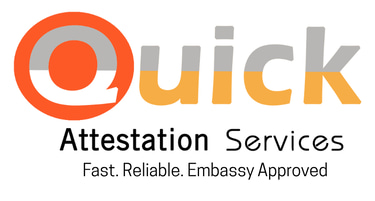UAE Attestation or Apostille: Which One is Right for You?
8/4/20254 min read


Understanding UAE Attestation
The process of UAE attestation plays a vital role in validating documents that are necessary for various purposes within the United Arab Emirates. Primarily, attestation refers to the formal verification of documents by designated government authorities. This verification is crucial in ensuring that documents such as educational credentials, marriage certificates, or commercial agreements meet legal requirements for authenticity when being used in the UAE.
UAE attestation serves multiple purposes. It is often required for employment opportunities, particularly for expatriates seeking work in the region. Employers typically necessitate attestation of educational certificates and professional licenses to adhere to local regulations. In addition to employment, attestation is integral for academic pursuits, such as enrolling in universities, where proof of prior qualifications must be verified through this official process. Moreover, for legal matters, including residency applications or property transactions, relevant documents must undergo attestation to ensure their legitimacy.
To initiate the attestation process, one must submit their documents to the appropriate authorities, which may include the Ministry of Foreign Affairs and International Cooperation in the UAE, alongside the respective embassies or consulates of the document's country of origin. The specific type of document determines the authorities involved and the requisite steps for attestation. Common documents requiring this process include birth certificates, police clearance certificates, and corporate documents.
It is essential to distinguish UAE attestation from other verification methods such as notarization or apostille. Notarization involves a licensed notary public who verifies signatures, while apostille is a simplified verification method employed under the Hague Convention. Unlike apostille, which is only applicable in countries that are parties to the convention, UAE attestation caters specifically to the legal framework of the UAE, ensuring that foreign documents are suitably vetted for local acceptance.
Exploring Apostille Services
Apostille refers to a specific form of certification used in international law to validate the authenticity of documents for use in foreign countries. Originating from the Hague Convention of 1961, the apostille simplifies the process of document verification by abolishing the need for consular legalization. This means that once a document has been apostilled in one member country, it is recognized as valid in all other signatory nations, thereby streamlining the international use of various legal documents.
Countries that are part of the Hague Convention mutually recognize apostille certificates, which are predominantly used within Europe, the Americas, and parts of Asia and Africa. To verify if a specific country recognizes apostille, one can refer to the official Hague Conference website or consult legal experts in international law. The increasing number of countries adopting this method of document verification demonstrates its effectiveness in promoting international legal cooperation.
In the UAE, obtaining an apostille for a document involves a systematic process. Initially, documents must be acquired from the appropriate local authority. Following this, the documents are submitted to the Ministry of Foreign Affairs and International Cooperation (MoFAIC) for apostille authentication. The MoFAIC affixes an apostille sticker or stamp on the document, signaling that it has been validated according to international standards. It is crucial to ensure that the documents are prepared properly to avoid any delays in the apostille process.
A wide range of documents can be apostilled, including educational certificates, birth and marriage certificates, business documents, and court orders, among others. Apostille services facilitate smoother transactions for individuals and businesses dealing with international affairs, thus eliminating the complexities that traditionally accompany document verification. Understanding the specifics of apostille services in the UAE is essential for anyone needing to ensure that their documents are valid in foreign jurisdictions.
Key Differences Between Attestation and Apostille
Attestation and apostille are two distinct processes that serve to verify the authenticity of documents, and understanding their differences is critical when it comes to international legal engagements. At the core of these processes lies the purpose: attestation is primarily used for validating documents for use in specific countries, while apostille is a streamlined method recognized globally, under the Hague Convention. This fundamental difference dictates the scenarios in which each is applicable.
Attestation can be described as a two-step process where documents are first verified by a notary public and then subsequently approved by the relevant government authority. This method is particularly effective for countries that are not signatories to the Hague Convention, thus requiring strict adherence to local validation procedures. It is applicable for a variety of documents, including birth certificates, marriage certificates, and educational credentials, mainly used in the Middle East, Asia, and Africa.
Another critical aspect to consider is the specific requirements involved in each process. While attestation may necessitate additional verification steps depending on the residency of the issuing authority, apostille issuance typically involves fewer bureaucratic hurdles, showcasing its efficiency. It is essential to evaluate your specific needs and intended use of documents to determine whether attestation or apostille is more suitable for your situation.
Choosing the Right Option for Your Needs
When navigating the complexities of document legalization, understanding whether to pursue UAE attestation or an apostille is crucial. The choice largely depends on the destination country, the type of documents involved, and the specific legal requirements that apply to your situation. Attestation is typically required for countries that are not part of the Hague Convention, while an apostille is suitable for those that are. Therefore, begin by researching the requirements of the country where your documents will be submitted.
Evaluate the nature of your documents. For example, personal documents such as birth certificates or marriage certificates usually require attestation for many non-Hague countries, while educational certificates often only need an apostille when used in Hague signatories. This distinction is important as applying the wrong process can delay your plans or lead to document rejection by authorities.
In addition to understanding the requirements based on the destination, consider the steps involved in both processes. For attestation, you typically need to have your document verified by relevant authorities, such as the UAE Ministry of Foreign Affairs and International Cooperation. Conversely, procuring an apostille involves obtaining certification from the Ministry of Foreign Affairs or other designated agencies. Both processes can take varying lengths of time, so establish a timeline that aligns with your needs.
Utilizing resources like legal advisory services can also be beneficial. These services often offer detailed guidance on the attestation or apostille process. Finally, keep in mind the importance of accurate communication with legal institutions during this procedure, as clarity and completeness of information will facilitate a smoother experience. Making an informed choice between attestation and apostille is imperative in ensuring that your documents fulfill their intended purposes legally.
